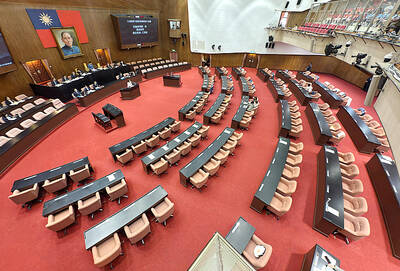The Democratic Progressive Party (DPP) yesterday condemned the ruling party’s controversial “one country, two areas (一國兩區)” proposal and demanded that President Ma Ying-jeou (馬英九) apologize and clarify his stance on Taiwan’s status.
If Ma failed to disclose the policymaking process behind the proposal, which the DPP said would make unification Taiwan’s only option, the DPP would not rule out “any form of action that could express Taiwanese people’s anger,” DPP spokesperson Lin Yu-chang (林右昌) told a press conference.
The party announced its formal position on the proposal, which had been heavily debated in the legislature for days, after its weekly Central Standing Committee meeting.
The proposal, touted by former Chinese Nationalist Party (KMT) chairman Wu Poh-hsiung (吳伯雄) during his meeting with Chinese President Hu Jintao (胡錦濤) on Thursday last week in Beijing, has changed the “status quo” of Taiwan’s territory and sovereignty and has violated Ma’s own policy of “no independence and no unification,” Lin said.
“Under this policy, unification [with China] would be Taiwan’s only option,” he said.
The policy is dangerous in that the international community would likely interpret “one country” as being the People’s Republic of China (PRC), making Taiwan a region under the PRC, Lin said.
What is even more unacceptable was the opaque policymaking process, he said, as top intelligence and cross-strait affairs officials were kept out of the decisionmaking circle.
Ma not only ignored legislative oversight and failed to communicate with the public, but he has also stayed silent on the matter to avoid responsibility, Lin added.
While Ma has not personally commented on the “one country, two areas” proposal, the Presidential Office on Monday said that the complete definition for cross-strait ties is “one Republic of China, two areas.”
Lin said the DPP has always maintained that Taiwan is a sovereign country and any change in the “status quo” should go through a national referendum.
“Taiwan’s sovereignty should not be a bargaining chip on the negotiation table, nor can it be transferred between political parties,” Lin added.
Lin said Ma should apologize and explain his policy, adding that the party would not rule out measures to give voice to public anger.
However, Lin declined to confirm if participation in a protest planned by several groups on May 20 — the day of Ma’s inauguration for his second presidential term — was one of the options.
The DPP yesterday also reached a resolution on another much-discussed issue — a presidential pardon for former president Chen Shui-bian (陳水扁), who is serving a 17-and-a-half-year sentence for corruption.
A number of pro-localization groups and DPP lawmakers, among them a senior legislator, Mark Chen (陳唐山), have recently advocated a presidential pardon for Chen and have launched a petition.
Lin said the DPP supports Chen’s judicial rights and right to medical treatment.
However, the party has urged its members to refrain from taking unilateral action before a more specific resolution is made, so the issue “would not be exploited by its political rivals as a tool to divide the DPP,” he said.

CROSS-STRAIT COLLABORATION: The new KMT chairwoman expressed interest in meeting the Chinese president from the start, but she’ll have to pay to get in Beijing allegedly agreed to let Chinese Nationalist Party (KMT) Chairwoman Cheng Li-wun (鄭麗文) meet with Chinese President Xi Jinping (習近平) around the Lunar New Year holiday next year on three conditions, including that the KMT block Taiwan’s arms purchases, a source said yesterday. Cheng has expressed interest in meeting Xi since she won the KMT’s chairmanship election in October. A source, speaking on condition of anonymity, said a consensus on a meeting was allegedly reached after two KMT vice chairmen visited China’s Taiwan Affairs Office Director Song Tao (宋濤) in China last month. Beijing allegedly gave the KMT three conditions it had to

‘BALANCE OF POWER’: Hegseth said that the US did not want to ‘strangle’ China, but to ensure that none of Washington’s allies would be vulnerable to military aggression Washington has no intention of changing the “status quo” in the Taiwan Strait, US Secretary of Defense Pete Hegseth said on Saturday, adding that one of the US military’s main priorities is to deter China “through strength, not through confrontation.” Speaking at the annual Reagan National Defense Forum in Simi Valley, California, Hegseth outlined the US Department of Defense’s priorities under US President Donald Trump. “First, defending the US homeland and our hemisphere. Second, deterring China through strength, not confrontation. Third, increased burden sharing for us, allies and partners. And fourth, supercharging the US defense industrial base,” he said. US-China relations under

The Chien Feng IV (勁蜂, Mighty Hornet) loitering munition is on track to enter flight tests next month in connection with potential adoption by Taiwanese and US armed forces, a government source said yesterday. The kamikaze drone, which boasts a range of 1,000km, debuted at the Taipei Aerospace and Defense Technology Exhibition in September, the official said on condition of anonymity. The Chungshan Institute of Science and Technology and US-based Kratos Defense jointly developed the platform by leveraging the engine and airframe of the latter’s MQM-178 Firejet target drone, they said. The uncrewed aerial vehicle is designed to utilize an artificial intelligence computer

The Chinese Nationalist Party (KMT) caucus yesterday decided to shelve proposed legislation that would give elected officials full control over their stipends, saying it would wait for a consensus to be reached before acting. KMT Legislator Chen Yu-jen (陳玉珍) last week proposed amendments to the Organic Act of the Legislative Yuan (立法院組織法) and the Regulations on Allowances for Elected Representatives and Subsidies for Village Chiefs (地方民意代表費用支給及村里長事務補助費補助條例), which would give legislators and councilors the freedom to use their allowances without providing invoices for reimbursement. The proposal immediately drew criticism, amid reports that several legislators face possible charges of embezzling fees intended to pay